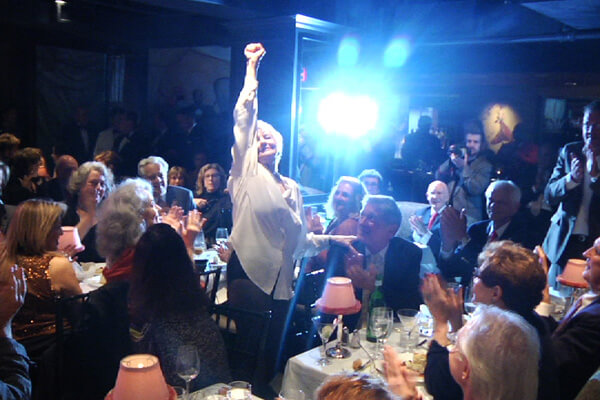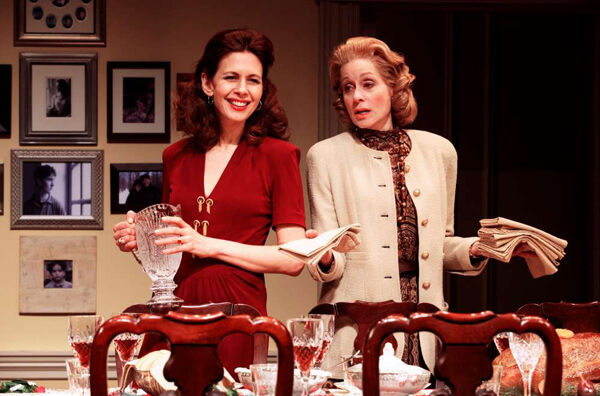Lee Wilkof and Stephen Ouimette (in foreground), with Brian Dennehy, Nathan Lane, and Salvatore Inzerillo in Eugene O’Neill’s “Iceman Cometh” at BAM through March 16. | RICHARD TERMINE
“The Iceman Cometh” starring Nathan Lane and Brian Dennehy in top form along with a flawless ensemble is first and foremost as good and true a rendering of Eugene O’Neill’s epic drama of alcoholism and despair as we are likely to see. The creative team from the Goodman Theatre in Chicago led by director Robert Falls is firing on all cylinders at BAM, but there is a challenge for the audience as well –– a marathon confrontation with the humanity of life’s losers who seem to be at rock bottom when the curtain rises on them in a Greenwich Village bar’s dark backroom, but who, we soon learn, have even farther to drop as the stage and their lives are illuminated over the course of almost five hours.
There are no Wednesday and Saturday matinees, just one exhausting performance a day six days a week of characters who are –– in the main –– exhausted from the get-go, often sleeping at their tables or sitting in vacant, alcoholic stupors staring into space (looking out at us and making it hard to look away). That is the guts of Dennehy’s turn as the spent radical, Larry Slade, who brushes off the intrusions of his imprisoned ex-lover and comrade’s young son, Don Parritt (Patrick Andrews, outstanding in a pivotal role), and of anyone else who tries to stir him from his wait for the release of death.
Late in the first act, traveling salesman Theodore “Hickey” Hickman (Lane), a graduate of Harry Hope’s (Stephen Ouimette, suitably pathetic) saloon, makes his semi-annual appearance –– much anticipated by the down-and-out patrons thirsty for his free drinks and glad-handing bull. But Hickey has come this day in 1912 with an unbelievably dark secret and a new agenda for the men and the hookers who also hang there: saving them from their “pipe dreams.” It’s a phrase from the 19th century for the kind of dreams one has when smoking opium and here it is repeated ad nauseam (44 times to be exact), but it is cheap liquor and unbearable reversals in life that drive these men’s delusions.
O’Neill’s “Iceman Cometh” at BAM is a brilliant ordeal
“Have the guts to be who you are,” Hickey tells them –– an exhortation familiar to us in the LGBT movement –– but all he succeeds in doing is throwing their lives into turmoil. “Dat Hickey,” Joe Mott, the lone black denizen (John Douglas Thompson in a standout performance) says, “he gets my head all mixed up with craziness.”
A play this deep and long gives us an opportunity to reflect on lots of things beyond its great stagecraft. I couldn’t help think at age 61 about the state of my own dreams –– pipe, personal, and political. There is a character for most everyone to identify with at some level –– and each gets a chance to tell his or her story in the spotlight.
I saw echoes of “Our Town” (written in 1938, the year before O’Neill wrote this play, which was not produced until ’46) with its indelible graveyard scene where the dead sit and talk to the recently departed Emily. In “Iceman,” the near dead occupy the landscape similarly –– less relating to each other and more biding their time before the end. It also presages the tragicomedy that Samuel Beckett perfected in “Waiting for Godot” in 1953 –– homeless tramps by the side of a country road instead of in a dingy bar (Kevin Depinet’s breathtakingly simple set design lit moodily by Natasha Katz); like Godot, the iceman never comes, but he’s breathing hard offstage. And Hickey’s subversive party games made me think about the set-piece in Mart Crowley’s “The Boys in the Band” that bowed in 1968.
It may be heresy. It may not be permitted by the O’Neill estate. But while there are merits to lingering until midnight with these terrific actors and characters and deeply contemplating their lives and ours, even Shakespeare plays often get cut without any loss of impact –– and this one could be, too. But two characters notwithstanding, you can’t hurry death much as you may desire The End.
THE ICEMAN COMETH | Brooklyn Academy of Music, Harvey Theatre, 651 Fulton St. at Rockwell Pl. | Through Mar. 16: Tue.-Sat. at 7 p.m.; Sun. at 3 p.m. | $35 to $180 at bam.org or 718-636-4100 | Four hrs., 45 mins., with three intermissions



































